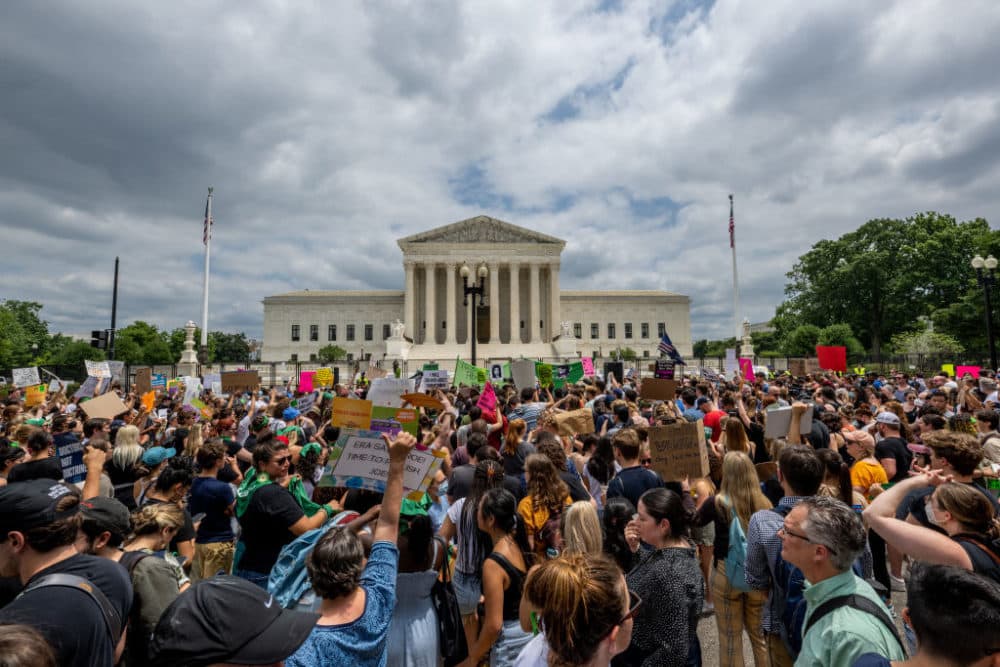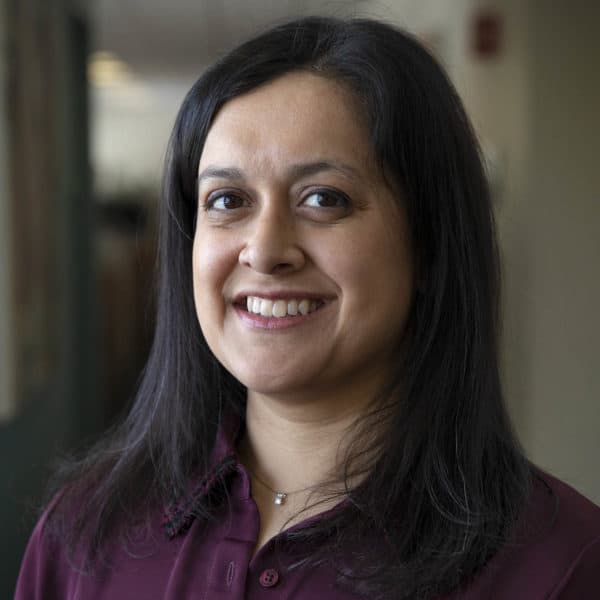Advertisement
Health care providers are seeing 'a steady stream' of people traveling to Mass. for abortion care

This week marked the 50th anniversary of Roe v. Wade, the landmark U.S. Supreme Court decision that secured the right to abortion in America.
For abortion rights supporters, it’s a bittersweet anniversary because the Supreme Court overturned Roe in the Dobbs decision last year. More than a dozen states have since banned or heavily restricted abortion.
In Massachusetts, abortion remains legal and has broad support from the medical community. More than a hundred medical professionals gathered at Brigham and Women’s Hospital on Monday to mark the anniversary of Roe and discuss the future of abortion access.
WBUR asked two OB-GYNs and abortion care providers how they’re thinking about abortion rights 50 years after Roe — and seven months after Roe was reversed.
Dr. Deborah Bartz is associate director of the Brigham’s family planning clinic, and Dr. Alisa Goldberg leads the Brigham’s family planning division. This interview has been edited and condensed.
As a health care provider, what does the anniversary of Roe mean to you?
Bartz: "We love doing this work. This work is incredibly inspiring, and we don't want to lose focus of this mission. So the 50th anniversary, it’s a day for us to recognize what Roe v. Wade was, and what it meant for so many people for so long, and just come together in a celebratory way for the work that we do."
Goldberg: "Why celebrate Roe now that it’s gone? I think the reason to celebrate is in recognition of a time and many years that followed where government and policy put the health, the lives and the welfare of women first — women and people who can get pregnant.
"What has been so stark since the Dobbs decision is that policies are now shifting away from a primary concern on the health and well-being of pregnant people. I'm hopeful that maybe we can get back to that at some point, where policies first and foremost protect the health and welfare of the people that they're designed to serve."
Why do you feel abortion is an essential part of health care and should be widely available?
Goldberg: “The risk of death is 14 times higher with childbirth than with early abortion. So if someone is pregnant, and is contemplating whether or not to continue that pregnancy, the option with the lowest risk to her health and life is an early abortion.
"Even among patients who want to be pregnant, things don't always go according to plan, and a variety of maternal health conditions or obstetric complications occur. In those circumstances, the risks become even higher. And often, it is in the best interest of the health of the patient to terminate the pregnancy.
"When balancing how much risk to take to the person’s health and life, the person themselves should have the deciding vote."
Bartz: “Those of us that work in abortion care, we in no way ignore the idea that abortion is hard, that there is a space of tension that all of us feel as we consider the moral status of the fetus and the reproductive rights and reproductive health concerns of the pregnant person.
"We have taken care of many patients across the whole spectrum — including patients who firmly believe that abortion is wrong at the same time that they are getting their own abortion. We believe strongly that every case is complicated and nuanced, and that each patient is in the best position to make her own reproductive health care decisions. We allow them the space to make those decisions.
"There are some life-saving abortions. Some cases are emotionally life-saving."
Doctors are sometimes targeted for this work. Do you feel any greater risk of providing abortion care since Roe was overturned last year?
Goldberg: "This is not new, and it comes in waves. There are points in time when things flare, and some people get riled up. And then the rhetoric settles down, and then maybe the people who are riled up are a little settled down.
"It's something that we've had to think about in the back of our minds from the beginning. When you take this on, you have to think about it."
Bartz: "There's no doubt that society is indeed becoming more polarized on a whole host of issues. It's concerning how society is going in this direction.
"I think we just need to take a deep breath, and we just need to do the work that we feel is important, and do it in a way that's smart, and in a way that's safe, and make sure that our patients are taken care of in the best way possible."
In your clinic, are you seeing more patients from states that have recently restricted abortion?
Goldberg: "We are definitely seeing a steady stream. We are certainly seeing people from those states — people who have resources, who can travel, and largely people who have a reason to come to Massachusetts, either because they have family or friends here, they have ties to the region, or sometimes because they have a health care provider in their state who knows a health care provider in our state and makes a referral. We’re probably seeing the most people from Texas."
Bartz: "We have seen patients come from the South and the Midwest, but they tend to be patients of demographics that have the ability to make those travel arrangements, unfortunately. So it really has fueled inequities within health care."
